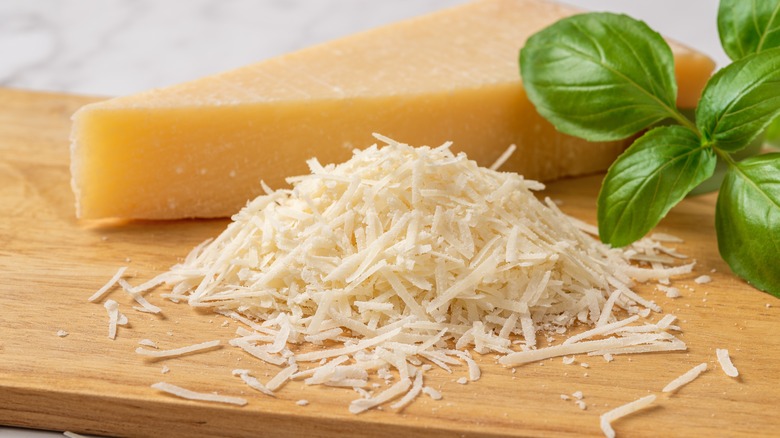The Unique Cheese That Could Help Lower Your High Blood Pressure
Fruits, veggies, and fibrous whole grains are among the top foods recommended for people looking to lower high blood pressure. Recommendations such as these probably come as no surprise, but what may be a bit more unexpected is that ordering a cheese plate appetizer every now and again may do the same.
According to the findings of a 2022 study published in the scientific journal Nutrients, researchers found a causal link between eating cheese and decreases in high blood pressure, as well as a reduced risk of heart failure, coronary heart disease, and ischemic stroke. However, we're often cautioned against overindulging in cheese, as some experts report that its high salt and saturated fat content may make one more susceptible to hypertension and cardiovascular disease (via the British Heart Foundation). Granted, some cheeses are healthier than others, but research shows there may be a happy medium depending on what type of cheese is on that charcuterie board. If it's Grana Padano, you may be doing your blood pressure a favor.
The effects of Grana Padano cheese on blood pressure
Grana Padano is an Italian semi-fat cheese that undergoes a lengthy maturation process. Researchers from a 2018 study published in the European Review for Medical and Pharmacological Sciences wanted to see how daily supplementation with cheese impacted the blood pressure of 30 patients with cases of mild to moderate hypertension. Patients either received a daily supplement containing 30 grams (approximately 1 ounce) of Grana Padano cheese or a placebo made up of bread crumbs with added fats and salt.
After two months, the researchers saw significant drops in both systolic and diastolic blood pressure in patients who received the cheese supplement. Within a 24-hour period, patients who consumed Grana Padano cheese every day experienced an average drop of 3.5 millimeters of mercury (mmHg) in systolic blood pressure (the number on top) and a mean decrease of 2.4 mmHg in diastolic blood pressure (the number below). According to Men's Health, isoleucine-proline-proline (IPP) and valine-proline-proline (VPP) are the two compounds in Grana Padano cheese that we have to thank for benefiting our blood pressure.
How much Grana Padano cheese to eat per day to benefit blood pressure
IPP and VPP are two peptides that are released during Grana Padano cheese's ripening period (via the European Review for Medical and Pharmacological Sciences). Functioning much like angiotensin-converting enzyme (ACE)-inhibitor medications, which are commonly prescribed to patients with hypertension, IPP and VPP block the release of blood vessel-constricting hormones in the body that would otherwise raise one's blood pressure (via Men's Health).
The U.S. Food and Drug Administration (FDA) explains that a blood pressure reading of 120/80 is considered normal, while a reading of 130/80 or above is indicative of high blood pressure. While cheese-lovers may rejoice, it is recommended that those with hypertension still consume it mindfully. As experts have pointed out, along with cheese comes fat and salt, and too much of it can work against our heart health. Rather than adding Grana Padano cheese to every meal, try switching things up by eating just 1 ounce per day in place of another dairy serving that you would normally eat, but perhaps has gotten a little boring lately. To learn more, check out some other diet tips for patients with high blood pressure.



